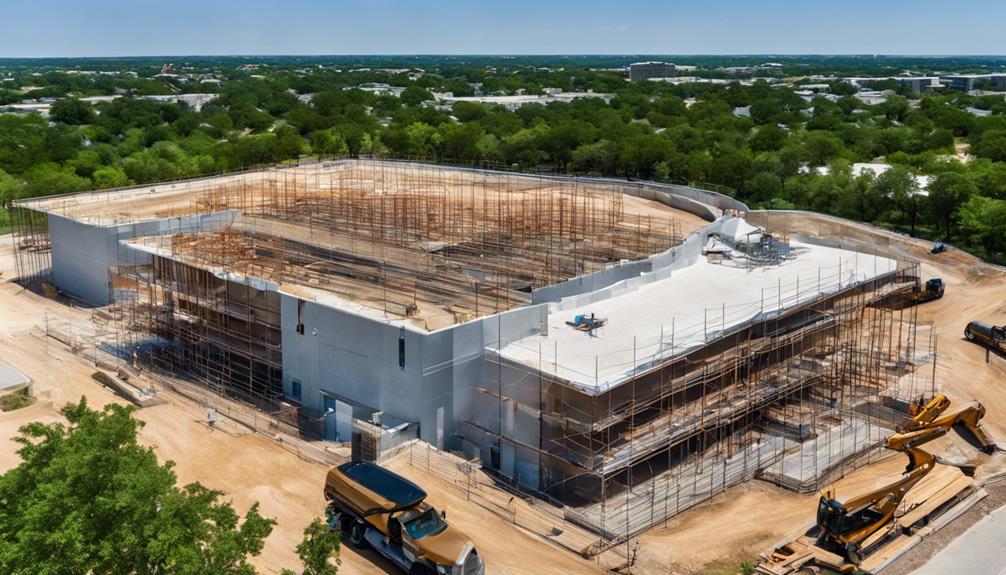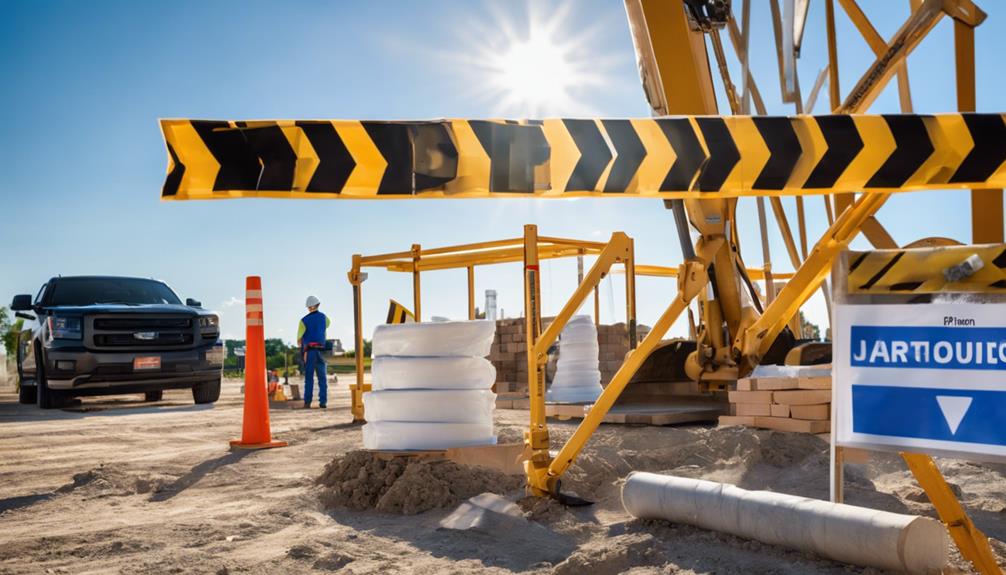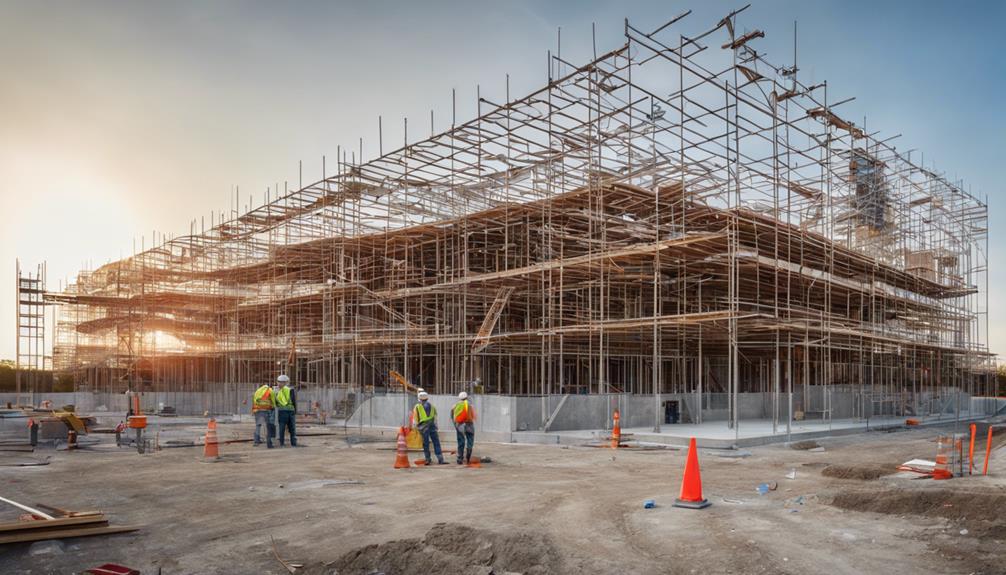If you're navigating the construction landscape in Round Rock, TX, understanding the Temporary Certificate of Occupancy (TCO) process is crucial. You might find that securing a performance bond can significantly impact your project's success, ensuring compliance and financial protection. However, the steps to obtain a TCO are often more complex than they seem at first glance. What challenges could arise during this process, and how can you prepare to address them effectively?
Understanding Temporary Certificates of Occupancy

When you're in the process of completing a building project, understanding Temporary Certificates of Occupancy (TCO) is crucial. A TCO allows you to occupy a building before the final inspections are complete, provided certain conditions are met. This can be especially helpful if you need to move in quickly or start using the space for business purposes.
To obtain a TCO, you must demonstrate that the building is safe and habitable, even if minor work remains. Typically, this involves passing specific inspections, such as those for fire safety, structural integrity, and plumbing.
Keep in mind that a TCO isn't a permanent solution; it's temporary and often comes with conditions you must fulfill within a specified timeframe.
While you hold a TCO, you can use the property, but you're still responsible for completing any outstanding work. Failing to meet the conditions set forth in the TCO could lead to fines or the revocation of your occupancy rights.
Therefore, staying organized and communicating with your local building department is essential to ensure a smooth transition from a TCO to a full Certificate of Occupancy.
Importance of a Performance Bond
Obtaining a Temporary Certificate of Occupancy can be a key step in your building project, but it often comes with specific requirements that need to be fulfilled. One of the most crucial requirements is securing a performance bond. This bond acts as a safety net, ensuring that the project meets local regulations and is completed on time.
In fact, the performance bond serves as a legally binding agreement that protects the owner from contractor default, providing peace of mind throughout the building process. Performance Bonds guarantee that you'll fulfill your contractual obligations. If you fail to complete the work as promised, the bond protects the city and any stakeholders involved, providing financial compensation to cover the costs of hiring another contractor. This reassurance makes it easier for you to gain the necessary approvals and permits.
Moreover, having a performance bond can enhance your credibility with clients and investors. It demonstrates that you're serious about your project and committed to quality work. This can lead to more opportunities and partnerships in the future.
In short, a performance bond isn't just a requirement; it's a valuable asset that safeguards your investment and promotes trust in your building endeavors. So, ensure you prioritize obtaining one as you navigate the process of securing your Temporary Certificate of Occupancy.
Eligibility Criteria for TCO

Securing a Temporary Certificate of Occupancy (TCO) hinges on meeting specific eligibility criteria that ensure your building is safe and compliant with local regulations.
First, you need to have completed all necessary construction and renovations, ensuring they're in line with approved plans and codes. This means all structural, electrical, plumbing, and mechanical systems should be installed properly and operational.
Additionally, obtaining the appropriate California Surety Bonds can be crucial in demonstrating financial responsibility and commitment to project completion.
You'll also need to pass inspections conducted by local authorities, confirming that your building adheres to zoning laws and safety standards. If you're planning to occupy only part of the building, you must demonstrate that the occupied area is safe for use.
Additionally, you should address any outstanding permits and fees. It's crucial to have all documentation in order, including proof of insurance and a performance bond. This shows your commitment to completing the project and adhering to regulations.
Lastly, make sure your property is accessible, with necessary utilities like water and electricity functioning.
Steps to Obtain a TCO
To obtain a Temporary Certificate of Occupancy (TCO), you'll need to follow a series of essential steps that ensure compliance with local regulations.
First, gather all necessary documentation, including construction plans, inspection reports, and any permits you've secured. This paperwork will be crucial during the application process.
Next, reach out to the Round Rock Building Division to schedule an inspection of your property. During this inspection, city officials will assess whether your building meets safety and code requirements. Make sure your property is ready by addressing any outstanding issues that could delay approval.
Once the inspection is complete, you'll need to submit your TCO application along with the required fees. Be mindful of any specific forms or additional documents the city may require, as incomplete submissions can prolong the process.
After submitting your application, you may need to wait for a review period during which city officials will evaluate your request.
If everything checks out, you'll receive your TCO, allowing you to occupy the building while you finalize any remaining construction.
Role of Performance Bonds in TCO

When it comes to the Temporary Certificate of Occupancy (TCO), performance bonds play a significant role in ensuring that projects are completed in accordance with local regulations. By requiring a performance bond, the city holds you accountable for fulfilling your contractual obligations. This bond acts as a financial guarantee that you'll complete the necessary work to meet safety and building standards, similar to how DoD Performance Bonds protect the government against contractor defaults.
When you secure a performance bond, you're providing assurance not just to the city but also to future occupants that the construction meets all required codes. Should you fail to complete the project or adhere to the regulations, the bond can be claimed to cover the costs of completing the work or correcting any deficiencies. This helps protect the interests of everyone involved, including potential tenants who might be eager to move in.
Additionally, having a performance bond can enhance your credibility as a contractor or developer. It demonstrates your commitment to quality work and compliance, which can lead to smoother interactions with local authorities.
Costs Associated With Performance Bonds
What costs should you anticipate when obtaining a performance bond? First, there's the premium you'll need to pay, which typically ranges from 1% to 3% of the total bond amount. This percentage can vary based on factors like your credit score, the type of project, and the bond amount itself. If your credit isn't stellar, you might face higher premiums.
Additionally, you might encounter fees for underwriting and processing your application. These fees can add up, so it's wise to ask your surety company about any extra costs upfront.
Some companies may also charge for renewals if your project extends beyond the initial bond period.
Don't forget about the potential costs related to collateral. In some cases, a surety may require you to provide collateral to secure the bond, which could tie up your cash flow.
Lastly, you might consider legal or consulting fees if you need expert advice during the process.
Common Challenges in the Process

Navigating the process of obtaining a temporary certificate of occupancy can present several common challenges.
First, you might find that gathering the necessary documentation is more complicated than it seems. You'll need to compile various permits, inspections, and approvals, which can take time and effort.
Next, you could face delays due to scheduling conflicts with inspectors or other relevant parties. It's not uncommon for inspections to be pushed back, potentially setting you back in your timeline.
Additionally, you may encounter issues with compliance. If your property doesn't meet all the local building codes, it can lead to further complications and require additional work.
Communication is another hurdle. You might find it difficult to get clear answers from city officials or contractors, leaving you feeling frustrated and uncertain about the next steps.
Lastly, don't overlook the financial aspect; unexpected costs can arise, especially if additional work is needed to meet requirements.
Local Regulations in Round Rock
Local regulations in Round Rock play a crucial role in the process of obtaining a temporary certificate of occupancy.
You'll need to familiarize yourself with the city's building codes, zoning laws, and safety standards. These regulations ensure that your property meets all necessary requirements before you're allowed to occupy it temporarily.
First, check the specific zoning requirements for your property. Different areas may have unique restrictions that could affect your project.
Next, make sure your construction complies with the local building codes. These codes cover everything from structural integrity to electrical systems, ensuring the safety of occupants.
You also need to consider inspections. The city typically requires various inspections throughout the construction process, and passing these will be crucial for securing your TCO.
Don't forget about environmental regulations, as these can impact your project's approval as well.
Benefits of Securing a TCO

Securing a temporary certificate of occupancy (TCO) offers several advantages that can significantly benefit your project.
First and foremost, a TCO allows you to occupy and use a building before final inspections are completed. This means you can start operations sooner, which is crucial if you're working with tight deadlines or financial constraints.
Additionally, obtaining a TCO can enhance your credibility with clients and stakeholders. It shows that you're committed to compliance and that you're making steady progress toward full occupancy. This commitment can foster trust and confidence in your project.
A TCO can also provide you with the flexibility to make necessary adjustments based on feedback from the initial occupancy phase. If any issues arise, you can address them while still utilizing the space, which can ultimately save you both time and money.
Lastly, securing a TCO can help you avoid costly delays, as it allows you to move forward while completing any outstanding requirements.
Tips for a Smooth Application Process
To ensure a successful application for your temporary certificate of occupancy, it's important to be well-prepared and organized. Start by gathering all necessary documentation, including your building plans, inspection reports, and any relevant permits. Having everything in one place will save you time and reduce stress during the application process.
Next, familiarize yourself with the specific requirements set by the Round Rock authorities. Each application can have unique stipulations, so double-check that you meet all criteria.
Consider scheduling a pre-application meeting with the local building department; this can provide valuable insights and help clarify any questions you may have.
Additionally, keep communication lines open with your contractor and any involved professionals. They can assist in ensuring that all work is up to code, making the inspection process smoother.
Once you've submitted your application, follow up regularly to check on its status. Being proactive can help you address any issues quickly.
Conclusion
In Round Rock, TX, securing a Temporary Certificate of Occupancy with a performance bond is crucial for your project's success. It not only allows early occupancy but also ensures compliance with local regulations. By understanding the process and preparing accordingly, you can navigate any challenges that arise. So, take the necessary steps and enjoy the benefits of a TCO, ensuring a smooth and efficient completion of your building project while keeping safety and standards in mind.


